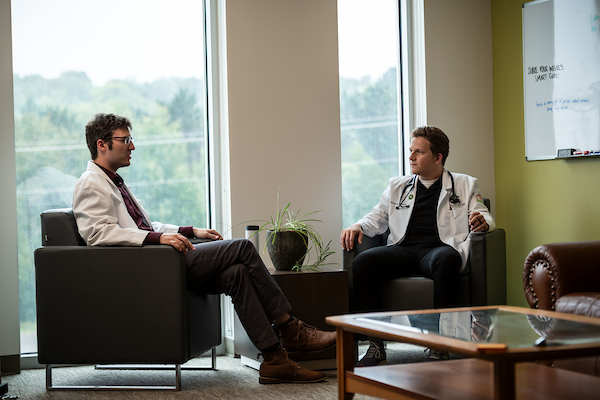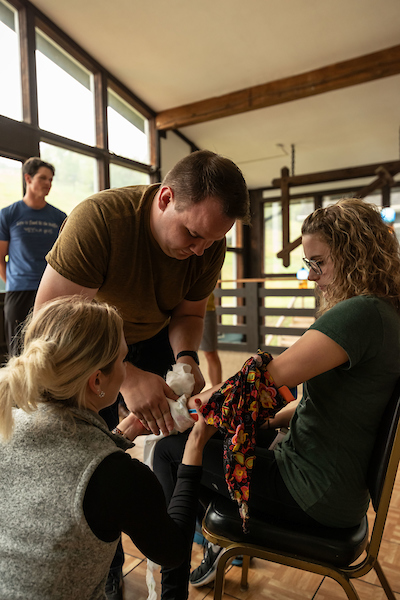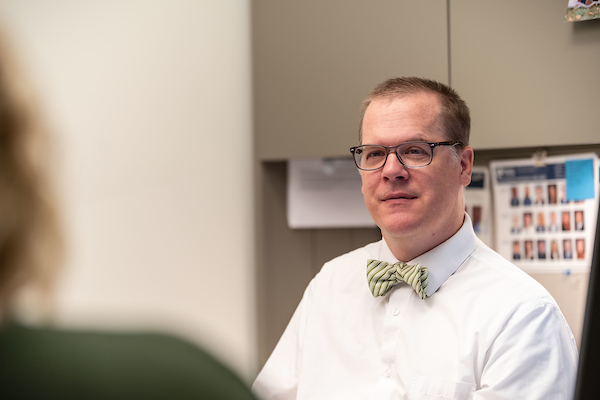Students in Upper Peninsula experience unique needs of rural medicine
July 24, 2024
 Susan Tincknell, student programs administrator for the College of Human Medicine’s Upper Peninsula Region Campus, frequently calls recent graduates to ask how they are doing in their residency programs.
Susan Tincknell, student programs administrator for the College of Human Medicine’s Upper Peninsula Region Campus, frequently calls recent graduates to ask how they are doing in their residency programs.
“I was just talking to an alumnus down in Virginia, and she said she wants to get back up here,” Tincknell said. “She can’t wait to come back to the Upper Peninsula.”
She hears that often from graduates of the Rural Physician Program based at the Upper Peninsula Region Campus. Many tell her that enrolling in the program “hands down was the best decision they ever made,” Tincknell said.
That is good news for the 300,000 people spread across the vast Upper Peninsula, an area that historically has been medically underserved.
The 10 students graduating in May 2024 will head elsewhere for residencies in internal medicine/emergency medicine, general surgery, orthopedic surgery, family medicine, pediatrics, and internal medicine, said Stuart Johnson, DO, the community assistant dean for the Upper Peninsula Region Campus. He expects many will return.
“We know that physicians who train in rural areas are more apt to practice in rural areas,” he said. Since its founding in 1974, the Upper Peninsula Region Campus, based in Marquette, has graduated 350 doctors. More than 26 percent returned to the Upper Peninsula to practice medicine. Some grew up in rural areas, including in the U.P. Some came from large cities.
Since its founding in 1974, the Upper Peninsula Region Campus, based in Marquette, has graduated 350 doctors. More than 26 percent returned to the Upper Peninsula to practice medicine. Some grew up in rural areas, including in the U.P. Some came from large cities.
After completing their first two years of medical school in East Lansing or Grand Rapids, the students accepted into the Rural Physician Program head north, where they spend about 70 percent of their time in the UP Health System hospital in Marquette, the Upper Peninsula’s largest city with a population of nearly 21,000. The rest of their time, the students set out for some 30 clinics and physicians’ offices in the small towns from Sault Ste. Marie to Ironwood.
“The reason it’s called the Upper Peninsula Region Campus is the whole Upper Peninsula is our campus,” Tincknell said.
Each student must complete a four-week rotation in rural family medicine. The U.P. campus is the only one of the College of Human Medicine’s eight campuses that offers a Northern Wilderness Emergency and Sports Medicine elective. Students are trained to treat illnesses and injuries that occur outside a clinical setting, such as on the ski hills, snowmobile trails, and forests of Northern Michigan.
The U.P. campus is the only one of the College of Human Medicine’s eight campuses that offers a Northern Wilderness Emergency and Sports Medicine elective. Students are trained to treat illnesses and injuries that occur outside a clinical setting, such as on the ski hills, snowmobile trails, and forests of Northern Michigan.
The Upper Peninsula Region Campus is one of the oldest in the country established specifically to train medical students in the unique demands of rural medicine.
“One of the strengths I see is our students get to experience medicine in a variety of communities,” Johnson said, “and they see how that plays out in a resource-limited community. They all have a desire to have a hands-on experience. It’s one-on-one working with doctors and patients. They learn how to suture, how to make an incision. The advantage is they gain that skillset early on.”
Johnson understands the draw of Northern Michigan. Raised in Marquette, he graduated from the MSU College of Osteopathic Medicine and completed an internship at Mercy Health Partners in Muskegon before returning to the U.P. “Number one, I love the people,” he said. They tend to be an independent, self-reliant lot, best described, he said, by the Finnish word “sisu,” which translates as brave, tenacious, and hardy. Yet most also are warm and accepting of newcomers, including medical students.
“Number one, I love the people,” he said. They tend to be an independent, self-reliant lot, best described, he said, by the Finnish word “sisu,” which translates as brave, tenacious, and hardy. Yet most also are warm and accepting of newcomers, including medical students.
But has Johnson ever harbored any doubts about his decision to return to the U.P., any regrets that he didn’t set up practice in a larger city? “Nope,” he said.

